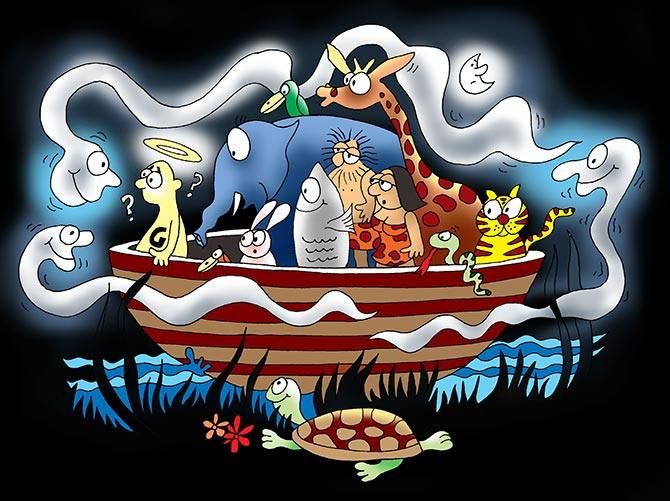Have you ever heard of/or played this longest-running virtual game?
Ashish Sharma gives you a lowdown on how to play this game!
Illustration: Uttam Ghosh/Rediff.com

Real Life is played by 7.4 billion players, who buy goods and services using in-game currency called 'money', as distinct from Second Life's in-game currency called 'Linden dollars'.
Real Life is the longest-running virtual game, and the registration process here is different from other virtual games.
A potential avatar has to wait until any two existing avatars, each of the opposite gender, get together and process his application in the game called Real Life.
Potential players have to register their avatars, which takes nine months to process, because many wandering souls are keen to join the game.
If you spend nine months waiting, you will get a functional body, but if you wait only eight months or a few weeks, you will be born with defects.
Please note that in Real Life, unlike other games, some in-game devices may prevent the creation of a new avatar. In such cases, nobody wants you -- sorry.
Which brings me to the next game point: Dying.
If you lose all your health while playing Real Life, you will be booted out of the game.
Alternatively, you could delete your account to initiate an important medical process known in Real Life gaming circles as 'suicide'.
Now, although it is good to learn from your mistakes, but once you die, you don't come back to the game world, unless you request 'reincarnation': A revolutionary in-game technology that lets two living avatars, each of the opposite gender, get together and process your 'reincarnation' request, even as you lie dying.
Talking of death, human avatars also have the option of destroying all other avatars. However, they cannot breathe underwater, and they must kill or get killed.
Animal avatars, on their part, can kill without mercy, strike without warning and, for a cat, meow without reason.
The downside to playing an animal avatar is you will be taken in as a pet, or murdered for meat.
Plant avatars do not enjoy too many advantages, other than the fact that some animals (and most humans) may take a piss on them, which they may lab-test or lab-taste, depending on their alignment.
The downside to playing a plant avatar is you can't kill or consume anyone as all your needs are met through 'photosynthesis', a revolutionary in-game technology that soaks and loves sunlight and water (who doesn't?).
Needless to say, such revolutionary in-game technologies of Real Life have pulled in many people, animals, and plants to the gaming scene.
This is borne out by statistics: 7.4 billion human avatars are playing it already; other life forms haven't been documented.
They all seem to enjoy realistic graphics, beautiful soundtracks, original gameplay. Real Life has thus become the most successful video game of our time, with God as its CEO, so let us analyse it.
Real Life graphics are more realistic than any other game. Combat occurs in real time, and even if you are a plant, you can use your roots to strangle the other.
Also, Real Life offers the biggest social network, connecting billions of humans, who use an in-game feature called 'talking'.
Speaking of revolutionary in-game technologies, one of the most noted features of Real Life is its physics engine, which provides simulation of a physical system. Players and subscribers have to pay up for its maintenance.
Human avatars delay payments through the use of special cards called 'credit cards', available at level 18 or age 18.
Plants rarely pay as they are required for the long-term sustainability of the game environment.
This, of course, may change, depending on how the physics engine is implemented in the future.
Wild animals do not have any monthly fee; domestic animals may pay for their accounts by shadowing human avatars.
In this way, the huge commercial success of Real Life has inspired creation of other virtual games that promise new and exciting features.
At present, God is considering to sue one such game called Second Life for trademark violation, as some get confused between Real Life and Second Life.











